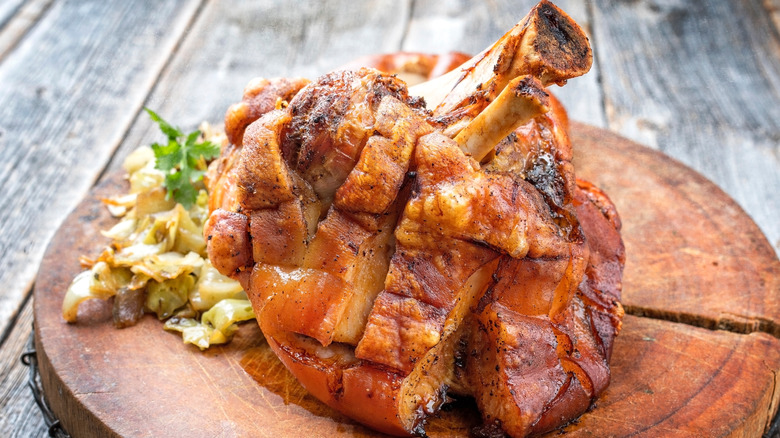Why Some People Are Superstitious About Eating Pork On New Year's Day
The New Year is coming, and it's a blank slate, right? A New Year equals a new you, with promises to start going to the gym, keeping up with a bullet journal, and cooking healthier meals on your list of resolutions. Everyone just wants to start the New Year off right, so many cultures around the world have their own New Year's superstitions to give you a boost of good luck when the clock chimes at midnight.
In Argentina, for example, people eat beans on New Year's Eve, which Argentinians believe will bring the eater job security. Brazilians will travel to the famous Copacabana beach in Rio de Janeiro to throw white flowers into the waves – gifts to Yemanja, an ocean spirit – for strength. Chinese Spring Festival (the lunar new year) happens between late January and mid-February, but there's no shortage of superstitions, from eating jiaozi dumplings to not cleaning their homes during the first two days of the New Year – so you don't sweep out the good fortune. Meanwhile, in Europe, the Scots give gifts like salt, bread, and whisky if they're the first guests of the New Year. In Denmark, people save their broken dishes and throw them at their neighbor's houses for good luck (via MentalFloss).
Early immigrant settlers to the United States brought their New Year superstitions with them, which have spread throughout the U.S.
The traditions was brought to the U.S. by German settlers
Many German and Eastern European-descended Americans eat pork and sauerkraut on New Year's Eve. The meal is believed to bring wealth and good luck in the new year because when pigs search for food, or "root," they do so going forward, which symbolizes how you should enter the new year – looking forward. This might also be why people wouldn't eat, say, lobster or chicken for luck in the new year, as lobsters walk backward, and chickens and turkeys scratch the ground backward. German and Eastern European settlers to the United States in the 17th and 18th centuries brought these superstitions with them (via Reader's Digest).
According to the outlet, pigs also represented a plentiful harvest because there was ample meat throughout the winter months after the traditional fall slaughter. To boost good luck, sauerkraut, made from cabbage, was added. Green is a color often associated with wealth, and cabbage leaves represented money. The long shreds of pickled cabbage could also have represented a long life.
Eating pork and sauerkraut for the new year is still a favorite tradition in states like Ohio and Pennsylvania, and is even eaten outside of the tradition because it just tastes good. The acidity of the pickled cabbage hits right with the pork. There are different variations of the dish, with some using kielbasa (Polish sausage) or hot dogs for a kid-friendly version (via PA Eats).

